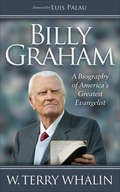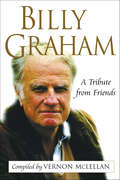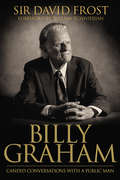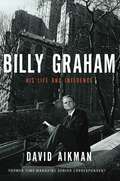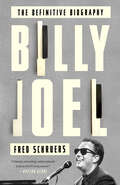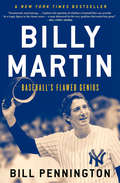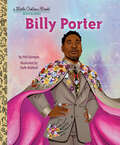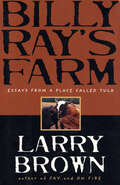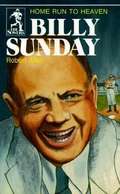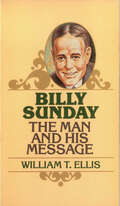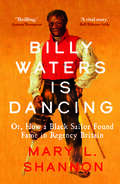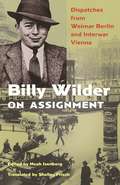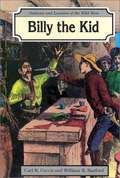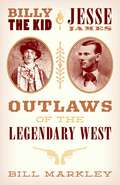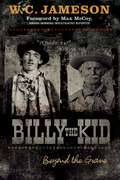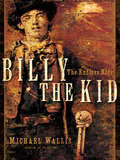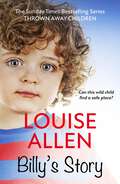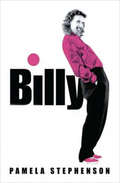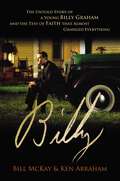- Table View
- List View
Billy Graham and Seven Who Were Saved
by Lewis W. GillensonOne of the greatest preachers of all time, Billy Graham has penetrated the conscience of people throughout the world. Untold thousands have experienced dramatic spiritual changes as a result of Graham's evangelism. In this fascinating book, the stirring events in the conversions of seven remarkable people are movingly told. This is the wonderfully human story of their weaknesses and fears, and their agonizing struggles to overcome them. It is also the amazing account of the effects of Graham's inspiring ministry. Through him, these defeated souls were able to change their lives in a profoundly meaningful way. Some came to know happiness for the first time. The Seven Who Were Saved Jimmy Karam-- A tough politician who acknowledged his sins, but couldn't overcome them... Eleanor Searle Whitney-- A beautiful socialite who nearly gave up hope when her marriage ended in divorce... Jim Vaus-- An engineer who sold his wire-tapping services to both sides of the law... Johnny Spence-- A golf pro who traded sports for dope... Jean Dillard-- A painter who lost faith in God and herself... Stuart Hamblen-- A cowboy-singer who drowned his fortune in alcohol... Henderson Belk-- A spoiled boy whose self-indulgence almost ruined his family.
Billy Graham: A Biography of America's Greatest Evangelist
by W. Terry Whalin&“Our polarized, divided world dearly misses the spirit of grace that Billy Graham brought to the world . . . A biography that introduces him anew&” (Philip Yancey, bestselling author of What&’s So Amazing About Grace?). Billy Graham has preached the gospel message in person to more people than anyone in history, and millions more have heard him through television, radio, and film. His faithful witness is testimony to his great love of God and passion to serve Him. This easy-to-read biography tells Billy Graham&’s story, including his humble beginnings as a southern farm boy, his calling to the ministry, the start of the crusades, his service to America&’s leaders, and his later years preaching around the globe. As you read these details of a life dedicated to the cause of Christ, you will be encouraged. Also, these stories will inspire anyone who desires to give their life in service to God. Here&’s a fresh look at a contemporary man of God and giant of the faith. &“Well written and succinct, Billy Graham is an honest look at the man and his calling, his struggles to stay humble in the limelight, the difficulty of separation from his family, and his constant calling on God for the next step.&” —Deborah Bedford, New York Times–bestselling author of His Other Wife &“If you want to cultivate a passion for souls, get to know Mr. Graham in the pages of this book. I promise you&’ll be blessed!&” —Joni Eareckson Tada, Joni and Friends International Disability Center
Billy Graham: A Tribute from Friends
by Vernon McLellanBilly Graham's legacy is celebrated in a collection of poignant tributes and memories as leaders from the worlds of government, business, sports, entertainment and religion share their personal stories and remembrances of this remarkable man.
Billy Graham: Candid Conversations with a Public Man
by David FrostMost people know Billy Graham the preacher.Many know Billy Graham the author.In this remarkable book, Graham reveals a personal side that few have seen before. For thirty years, Billy Graham and David Frost fascinated television audiences with their conversations about God, the Bible, and Graham's decades-long ministry. Frost asked the questions that thousands of viewers wanted to ask. Graham answered them with authenticity and grace. Along the way, Graham provided insight into life as an evangelist, a Christian father and grandfather, and a public figure in a changing culture. Most of all, Graham's words show what it means to live out your beliefs--whether you speak to millions of people around the world or simply want to live faithfully at home and work. With a chronology of Graham's life, a preface from Frost, and a foreword from his grandson, Tullian Tchividjian, this weaving of stories, interviews, and reflections will inspire you to respond to God's call with no reserve.
Billy Graham: His Life and Influence
by David AikmanIF THERE WERE SUCH A JOB AS THE NATION&’S PASTOR, IT WOULD GO TO BILLY GRAHAMGraham wasn&’t born with a mandate to become the face of modern evangelism. Growing up, he wasn&’t much different from other boys in his town. Billy was more interested in going to the movies than the moving of the Holy Spirit, and he spent more time chasing girls than God. But at a revival meeting the day before his sixteenth birthday, Graham committed himself to Christ and never looked back. That day, he started on the path that would make him the most influential Christian leader in American history. In Billy Graham: His Life and Influence, acclaimed author David Aikman probes critical episodes of Graham&’s life that help explain his profound impact, both on the public life of America and other nations and the private lives of their cultural and political leaders. From the racial upheaval of the civil rights movement to the social turmoil of the cold war, Aikman traces Graham&’s profound influence on a nation as it went through wrenching changes over the span of more than a half century. Through vivid anecdotes and fascinating details, Billy Graham: His Life and Influence tells the story of how a country boy from Charlotte with a heart for God grew up to help shape the world.
Billy Graham: Just Get Up Out of Your Seat
by Catherine MackenzieBilly was born on a dairy farm in Charlotte, North Carolina in 1918 just days after the signing of the armistice that ended the first world world war. At the age of sixteen Billy Graham came to Christ during a Christian revival meeting and it wasn't long before he felt the call to preach. <p><p> With the help of his wife Ruth and many other friends and colleagues Billy Graham set out to preach to the world. The Billy Graham Evangelistic Association was founded and since that day Billy has preached to over 80 million people in more than 185 countries. Millions more have been reached through television, video, film and webcasts. He has founded newspapers; film companies, magazines and radio ministries. Communism and Apartheid, Segregation and Terrorism - Billy Graham has faced up to all Christianity's major opponents of the twentieth century. <p> From playing the bail money to get Martin Luther King out of jail to addressing the memorial service in Washington after the collapse of the World Trade centre, Billy Graham has been there for people with practical help and a message of hope that is timeless.
Billy Graham: The Man I Knew
by Greg LaurieBilly Graham Was the World&’s Best-Known Evangelist—Loved and Admired by Millions. But Very Few Knew Him Personally. Pastor and bestselling author Greg Laurie was one of those fortunate few, blessed with an insider&’s view of Billy Graham&’s world for more than two decades. With the same painstaking research and eye for detail that distinguishes his previous biographies, Steve McQueen: Salvation of an American Icon and Johnny Cash: The Redemption of an American Icon, Laurie now turns to the life of his beloved mentor, offering the intimate perspective of a disciple and friend. As a strapping North Carolina farm boy, Graham surrendered his life to Jesus at a camp meeting led by a blustery itinerant preacher, but he never lost the mischievous twinkle in his eye or his fun-loving air. Laurie sheds light on Graham&’s lesser-known struggles—such as a broken heart before he met the love of his life and a crisis of faith from which he emerged stronger than ever. From the evangelist&’s private challenges and public successes to his disappointments and joys, Billy Graham: The Man I Knew provides a vivid portrait of one of history&’s most remarkable Christian lives.
Billy Joel: The Definitive Biography
by Fred SchruersThe long-awaited, all-access biography of a music legendIn Billy Joel, acclaimed music journalist Fred Schruers draws upon more than one hundred hours of exclusive interviews with Joel to present an unprecedented look at the life, career, and legacy of the pint-sized kid from Long Island who became a rock icon.Exhibiting unparalleled intimate knowledge, Schruers chronicles Joel's rise to the top of the charts, from his working-class origins in Levittown and early days spent in boxing rings and sweaty clubs to his monumental success in the seventies and eighties. He also explores Joel's creative transformation in the nineties, his dream performance with Paul McCartney at Shea Stadium in 2008, and beyond.Along the way, Schruers reveals the stories behind all the key events and relationships--including Joel's high-profile marriages and legal battles--that defined his path to stardom and inspired his signature songs, such as "Piano Man," "Scenes from an Italian Restaurant," "New York State of Mind," and "She's Always a Woman." Throughout, he captures the spirit of a restless artist determined to break through by sharing, in his deeply personal lyrics, the dreams and heartbreaks of suburban American life.Comprehensive, vibrantly written, and filled with Joel's memories and reflections--as well as those of the family, friends, and band members who have formed his inner circle, including Christie Brinkley, Alexa Ray Joel, Jon Small, and Steve Cohen--this is the definitive account of a beloved rock star's epic American journey.
Billy Martin: Baseball's Flawed Genius
by Bill PenningtonThe New York Times bestseller. &“The sprawling, brawling, no-punches-pulled narrative Martin deserves . . . one of baseball&’s epic characters.&”—Tom Verducci, bestselling author of The Cubs Way Even now, years after his death, Billy Martin remains one of the most intriguing and charismatic figures in baseball history. And the most misunderstood. A manager who is widely considered to have been a baseball genius, Martin is remembered more for his rabble-rousing and public brawls on the field and off. He was combative and intimidating, yet endearing and beloved. In Billy Martin, Bill Pennington resolves these contradictions and pens the definitive story of Martin&’s life. From his hardscrabble youth to his days on the Yankees in the 1950s and through sixteen years of managing, Martin made sure no one ever ignored him. Drawing on exhaustive interviews and his own time covering Martin as a young sportswriter, Pennington provides an intimate, revelatory, and endlessly colorful story of a truly larger-than-life sportsman. &“Enormously entertaining . . . Explores the question of whether a baseball lifer can actually be a tragic figure in the classic sense—a man destroyed by the very qualities that made him great.&”—The Wall Street Journal &“Bill Pennington gives long-overdue flesh to the caricature . . . Pennington savors the dirt-kicking spectacles without losing sight of the man.&”—The New York Times Book Review &“The hair on my forearms was standing up by the end of the fifth paragraph of this book&’s introduction. I knew Billy Martin. I covered Billy Martin. But I never knew him like this.&”—Dan Shaughnessy, bestselling author of Reversing the Curse
Billy Porter: A Little Golden Book Biography (Little Golden Book Biographies)
by Phil StamperGet to know Billy Porter—a multi-talented star who shines on Broadway, TV, and at dazzling red carpet events—with this collectible Little Golden Book that features gorgeous full-color illustrations on every page!Billy saw that clothes were the perfect way to stand out and let people know who you are.Billy Porter has been impressing audiences ever since he played his award-winning role of Lola in the Broadway hit Kinky Boots. His story of chasing his dream to be a performer comes to life in Billy Porter: A Little Golden Book Biography. When you're Billy Porter, you dream big and you inspire others to love themselves!Look for more Little Golden Book biographies:• Lady Gaga• Rihanna• Zendaya• Elton John• Harry Belafonte
Billy Ray's Farm: Essays From A Place Called Tula
by Larry BrownIn his first work of nonfiction since the acclaimed On Fire, Brown aims for nothing short of ruthlessly capturing the truth of the world in which he has always lived. In the prologue to the book, he tells what it's like to be constantly compared with William Faulkner, a writer with whom he shares inspiration from the Mississippi land. The essays that follow show that influence as undeniable. Here is the pond Larry reclaims and restocks on his place in Tula. Here is the Oxford bar crowd on a wild goose chase to a fabled fishing event. And here is the literary sensation trying to outsmart a wily coyote intent on killing the farm's baby goats. Woven in are intimate reflections on the Southern musicians and writers whose work has inspired Brown's and the thrill of his first literary recognition. But the centerpiece of this book is the title essay which embodies every element of Larry Brown's most emotional attachments-to the family, the land, the animals. This is a book for every Larry Brown fan. It is also an invaluable book for every reader interested in how a great writer responds, both personally and artistically, to the patch of land he lives on.
Billy Sunday: Home Run to Heaven
by Robert A. AllenA biography of a professional baseball player who dedicated his life to spreading the gospel and became one of the most influential religious figures of the early twentieth century.
Billy Sunday: Runner for the Lord
by Elaine CunninghamThis is a story based on events in the life of Billy Sunday.
Billy Sunday: The Man and His Message (Golden Oldies)
by William Ellis"It seemed impossible for Billy Sunday to stand behind the pulpit and talk only with his mouth. When he alluded to the man who acts no better than a four-footed brute, Sunday was down on all fours and you saw that brute. In a dramatic description of the marathon, he pictured an athlete falling at the goal and--there lay the evangelist on the platform."Through his ministry, approximately three hundred thousand persons were led to faith in Christ.
Billy Sunday: The Man and His Message (Golden Oldies)
by William Ellis"It seemed impossible for Billy Sunday to stand behind the pulpit and talk only with his mouth. When he alluded to the man who acts no better than a four-footed brute, Sunday was down on all fours and you saw that brute. In a dramatic description of the marathon, he pictured an athlete falling at the goal and--there lay the evangelist on the platform."Through his ministry, approximately three hundred thousand persons were led to faith in Christ.
Billy Waters is Dancing: Or, How a Black Sailor Found Fame in Regency Britain
by Mary L. ShannonThe story of William Waters, Black street performer in Regency London, and how his huge celebrity took on a life of its own Every child in Regency London knew Billy Waters, the celebrated &“King of the Beggars.&” Likely born into enslavement in 1770s New York, he became a Royal Navy sailor. After losing his leg in a fall from the rigging, the talented and irrepressible Waters became London&’s most famous street performer. His extravagantly costumed image blazed across the stage and in print to an unprecedented degree. For all his contemporary renown, Waters died destitute in 1823—but his legend would live on for decades. Mary L. Shannon&’s biography draws together surviving traces of Waters&’ life to bring us closer to the historical figure underlying them. Considering Waters&’ influence on the London stage and his echoing resonances in visual art, and writing by Douglass, Dickens, and Thackeray, Shannon asks us to reconsider Black presences in nineteenth-century popular culture. This is a vital attempt to recover a life from historical obscurity—and a fascinating account of what it meant to find fame in the Regency metropolis.
Billy Wilder on Assignment: Dispatches from Weimar Berlin and Interwar Vienna
by Billy WilderAcclaimed film director Billy Wilder’s early writings—brilliantly translated into English for the first timeBefore Billy Wilder became the screenwriter and director of iconic films like Sunset Boulevard and Some Like It Hot, he worked as a freelance reporter, first in Vienna and then in Weimar Berlin. Billy Wilder on Assignment brings together more than fifty articles, translated into English for the first time, that Wilder (then known as "Billie") published in magazines and newspapers between September 1925 and November 1930. From a humorous account of Wilder's stint as a hired dancing companion in a posh Berlin hotel and his dispatches from the international film scene, to his astute profiles of writers, performers, and political figures, the collection offers fresh insights into the creative mind of one of Hollywood’s most revered writer-directors.Wilder’s early writings—a heady mix of cultural essays, interviews, and reviews—contain the same sparkling wit and intelligence as his later Hollywood screenplays, while also casting light into the dark corners of Vienna and Berlin between the wars. Wilder covered everything: big-city sensations, jazz performances, film and theater openings, dance, photography, and all manner of mass entertainment. And he wrote about the most colorful figures of the day, including Charlie Chaplin, Cornelius Vanderbilt, the Prince of Wales, actor Adolphe Menjou, director Erich von Stroheim, and the Tiller Girls dance troupe. Film historian Noah Isenberg's introduction and commentary place Wilder’s pieces—brilliantly translated by Shelley Frisch—in historical and biographical context, and rare photos capture Wilder and his circle during these formative years.Filled with rich reportage and personal musings, Billy Wilder on Assignment showcases the burgeoning voice of a young journalist who would go on to become a great auteur.
Billy the Kid (Outlaws and Lawmen of the Wild West)
by Carl R. Green William R. SanfordBiographies of famous and infamous men of the Western frontier. -- Entices the reluctant reader to relive the exciting days of the Wild West.
Billy the Kid and Jesse James: Outlaws of the Legendary West
by Bill MarkleyWho was the biggest, baddest outlaw in the Old West? Billy the Kid or Jesse James? Which outlaw did the most to wreak havoc across the frontier? And which outlaw left behind the biggest legacy? Author Bill Markley takes on those questions and more in this thoughtful and entertaining examination of these legendary lives.
Billy the Kid: Beyond the Grave (Beyond the Grave)
by W.C. JamesonDid Pat Garrett kill the wrong man in 1881 in Fort Sumner, New Mexico, or did the outlaw known as Billy the Kid live on as William Henry Roberts until 1948? W.C. Jameson analyzes the evidence, including use of new technology to produce a compelling case for Billy's survival. Heralded by Booklist as an enjoyable reexamination of a legendary piece of Americana, this book traces the life of the famous desperado and the controversy that still is debated today. Now in paperback!
Billy the Kid: The Endless Ride (Playaway Adult Nonfiction Ser.)
by Michael Wallis"Countless books have been written about the infamous outlaw ... this is surely one of the best."--Publishers Weekly, starred review In this revisionist biography, award-winning historian Michael Wallis re-creates the rich anecdotal saga of Billy the Kid (1859-1881), a young man who became a legend in his time and remains an enigma to this day. In an extraordinary evocation of the legendary Old West, Wallis demonstrates why the Kid has remained one of our most popular folk heroes. Filled with dozens of rare images and period photographs, Billy the Kid separates myth from reality and presents an unforgettable portrait of this brief and violent life.
Billy's Story (Thrown Away Children Ser.)
by Louise AllenFrom the bestselling author of the Thrown Away Children series comes another heartbreaking story of life in foster care.Louise has trouble on her hands from the first moment that 5-year-old Billy Blackthorn comes to stay. He is one of more than 20 children taken into care from a single family, and erupts into the Allen household with a volatility that is frightening and disturbing in equal measure. It is only as Louise begins to uncover the secrets of Billy's dark past that she begins to understand what made his family 'untouchable'.'Britain's top foster carer' The Sun'A shining light' Emily Finch, BBC
Billy's Story (Thrown Away Children Ser.)
by Louise AllenFrom the bestselling author of the Thrown Away Children series comes another heartbreaking story of life in foster care.Louise has trouble on her hands from the first moment that 5-year-old Billy Blackthorn comes to stay. He is one of more than 20 children taken into care from a single family, and erupts into the Allen household with a volatility that is frightening and disturbing in equal measure. It is only as Louise begins to uncover the secrets of Billy's dark past that she begins to understand what made his family 'untouchable'.'Britain's top foster carer' The Sun'A shining light' Emily Finch, BBC
Billy: Living With Billy Connolly
by Pamela StephensonBy turns heartbreaking and hilarious, this intimate biography of the British comic is &“a triumph of the will, an Angela&’s Ashes with punch lines&” (Publishers Weekly). One of the UK&’s most beloved stand-up comedians, Billy Connolly is recognized around the world for his HBO comedy specials and roles in movies like The Boondock Saints and Lemony Snicket&’s A Series of Unfortunate Events. An inspiration to generations of British comedians, including such stars as Eddie Izzard, Billy is known simply as &“The Big Yin&” in his native Scotland. But his road to success was anything but easy. Abandoned by his mother in a Glasgow tenement, abused by his father and the cruel aunt who became his caretaker, he would seem to have little chance of survival let alone meteoric success. Billy, the revelatory, poignant, and wildly entertaining biography is written by the woman who knows him best—his wife. Pamela Stephenson, a clinical psychologist, takes us through the heartbreaking and hilarious life of this comic legend, providing an intimate window into what made him the man he is today.
Billy: The Untold Story of a Young Billy Graham and the Test of Faith that Almost Changed Everything (Playaway Adult Nonfiction Ser.)
by Ken Abraham William Paul McKayThe remarkable true story of a young Billy Graham and his best friend who walked away from the faith. We all know how the story ends but how did it begin? Before he became a household name, and America's Pastor, he was simply known as Billy. When he wasn't playing baseball, he was discovering his love for Christian ministry. His best friend, Charles Templeton, was already on track to be a highly successful evangelist and the two young men began strategizing on how to win the world for Christ. That plan takes a drastic turn, however, when Templeton deserts the faith and becomes an atheist. The impact of this decision on a young Billy Graham is immeasurable and agonizing. Charles would later become the great intellectual architect for agnosticism and atheism. Billy would become the single greatest messenger for the Christian Gospel. It is one of the great untold dramas between friends - Atheism vs Christianity, betrayal and hope.

